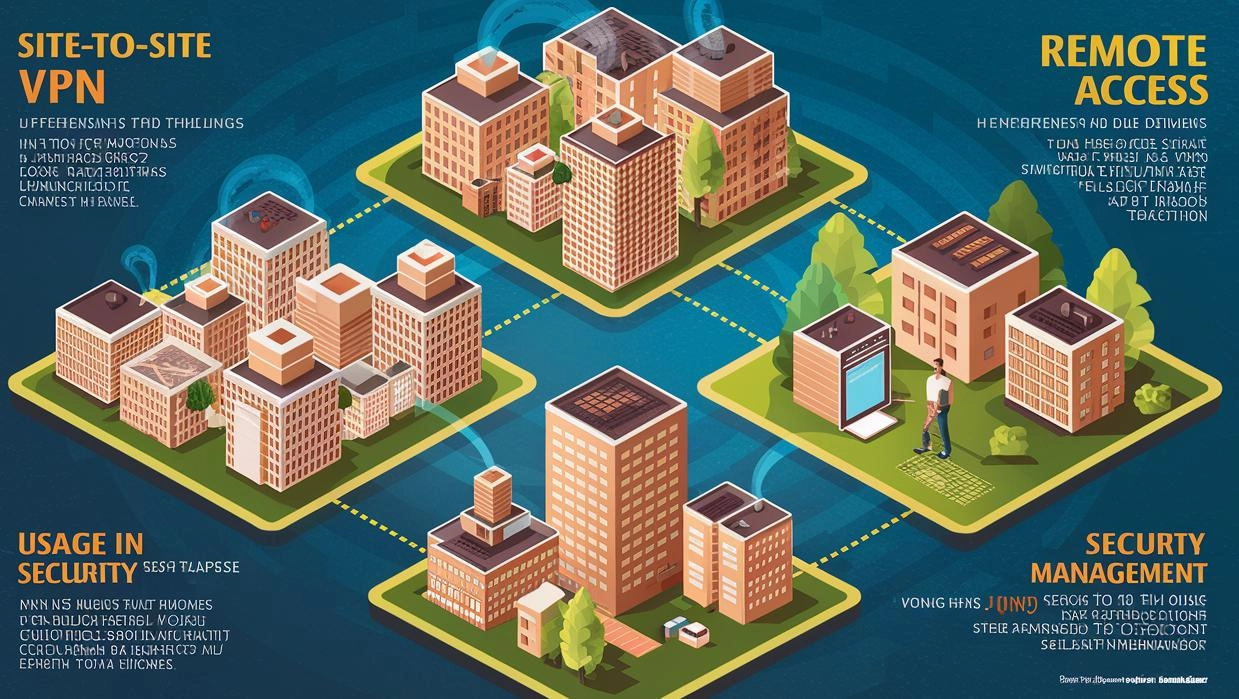ВПН между сайтами и ВПН удаленного доступа: что это и в чем различия

ВПН между сайтами (Site-to-Site VPN) и ВПН удаленного доступа — это различные виды виртуальных частных сетей, предоставляющие безопасное соединение между пользователями и сетями компаний. Каждый из них предоставляет пользователям уникальные возможности и выгоды, какие именно – рассмотрим ниже.
Site-to-Site ВПН и ВПН удаленного доступа: важные нюансы
ВПН между сайтами, также известный как ВПН между маршрутизаторами, использует технологию IPsec для создания безопасного туннеля между сетями клиента и удаленными сайтами. Он предназначен для связи между сетями организаций и обеспечения безопасного обмена данными. Однако в таком ВПН не допускается одновременное использование сервиса несколькими пользователями.
ВПН между сайтами обладает такими преимуществами:
- обеспечивает безопасное соединение между сетями;
- позволяет обмениваться данными и обращаться к сопряженным сетевым ресурсам;
- предлагает высокий уровень безопасности.
К недостаткам Site-to-Site ВПН относим необходимость дополнительного аппаратного и программного обеспечения, а также более сложную конфигурацию и управление.
В ВПН удаленного доступа отдельные пользователи подключаются к частной сети, получая удаленный доступ к ресурсам и услугам. Этот тип ВПН наиболее удобен для бизнеса и домашних пользователей, поскольку позволяет подключаться к сети из любого места. В отличие от ВПН между сайтами, ВПН удаленного доступа может использоваться несколькими пользователями одновременно.
К преимуществам ВПН удаленного доступа относим:
- обеспечение гибкого и удобного доступ для отдельных пользователей;
- возможность удаленным сотрудникам безопасно получать доступ к ресурсам компании.
Из недостатков: может работать медленнее из-за использования шифрования и дополнительного трафика, а также требует установки дополнительных компонентов программного обеспечения и обучение пользователей для грамотного использования.
ВПН удаленного доступа и ВПН между сайтами: сходства и различия
Сходства между ВПН между сайтами и ВПН удаленного доступа:
- Оба вида ВПН используют протоколы шифрования для обеспечения безопасности передачи данных через интернету и гарантируют защищенную передачу информации между пользователями и целевыми сетями.
- Оба типа ВПН обеспечивают конфиденциальность и целостность данных, передаваемых по сети.
- Требуют ту или иную форму аутентификации пользователя для доступа к сети, тем самым гарантируя, что доступ предоставляется только авторизованным пользователям. Они оба требуют процесса идентификации, чтобы гарантировать, что только проверенные пользователи имеют доступ к сети.
- Требуют дополнительного аппаратного или программного обеспечения для установки ВПН-соединения. Для обоих типов ВПН может потребоваться установка специального оборудования или программного обеспечения на стороне клиента для обеспечения безопасного соединения.
Рассмотрим основные различия между ВПН сайт-сайт и ВПН удаленного доступа:
- Доступ. В ВПН между сайтами используется метод безопасности IPsec для создания зашифрованного туннеля от сети одного клиента до удаленного сайта клиента. В VPN удаленного доступа индивидуальные пользователи подключаются к частной сети.
- Особенности настройки. В ВПН между сайтами не требуется настройка на каждом клиенте. В ВПН удаленного доступа настройка на каждом клиенте может быть необходима или не обязательна. Также ВПН между сайтами не требует, чтобы каждый пользователь инициировал настройку ВПН-туннеля. При удаленном доступе каждому пользователю требуется инициировать настройку ВПН-туннеля.
- Совместимость с протоколами. ВПН между сайтами поддерживает технологию IPsec. В то время как ВПН удаленного доступа поддерживает технологии SSL и IPsec.
- Параллельные подключения. В ВПН между сайтами не допускает использование сервиса несколькими пользователями одновременно. В ВПН удаленного доступа разрешено использование несколькими пользователями одновременно.
- Тип коннекта. ВПН между сайтами соединяет отдельные сети друг с другом. ВПН удаленного доступа соединяет удаленных пользователей из любого места с корпоративной сетью.
- Типичные сценарии использования. ВПН между сайтами широко используется в офисах LAN филиалов, которые должны подключаться к серверам, расположенным в штаб-квартире. ВПН удаленного доступа используется для роуминговых пользователей, которые хотят безопасно получать доступ к ресурсам/серверам.
В итоге, выбор между ВПН между сайтами и ВПН удаленного доступа зависит от уникальных потребностей организации и ее пользователей. ВПН между сайтами подходит для организаций, требующих надежного соединения между несколькими сетями, в то время как ВПН удаленного доступа обеспечивает гибкий и безопасный доступ для отдельных пользователей из любого места. Важно внимательно оценить преимущества и недостатки каждого варианта перед принятием решения.p>
Личный ВПН-сервер: лучший представитель ВПН удаленного доступа
Личный ВПН-сервер чаще всего используется для создания защищенного канала связи между устройством пользователя (например, компьютером, смартфоном или планшетом) и удаленными ресурсами, к которым пользователь хочет получить доступ.
Все самое интересное и важное о личных ВПН-серверах - на VPN.how. Здесь же вы сможете найти всю необходимую информацию, чтобы эффективно и без излишних трудозатрат выбрать и купить личный ВПН-сервер. Изучайте этот ресурс и пользуйтесь лучшими продуктами в индустрии ВПН.